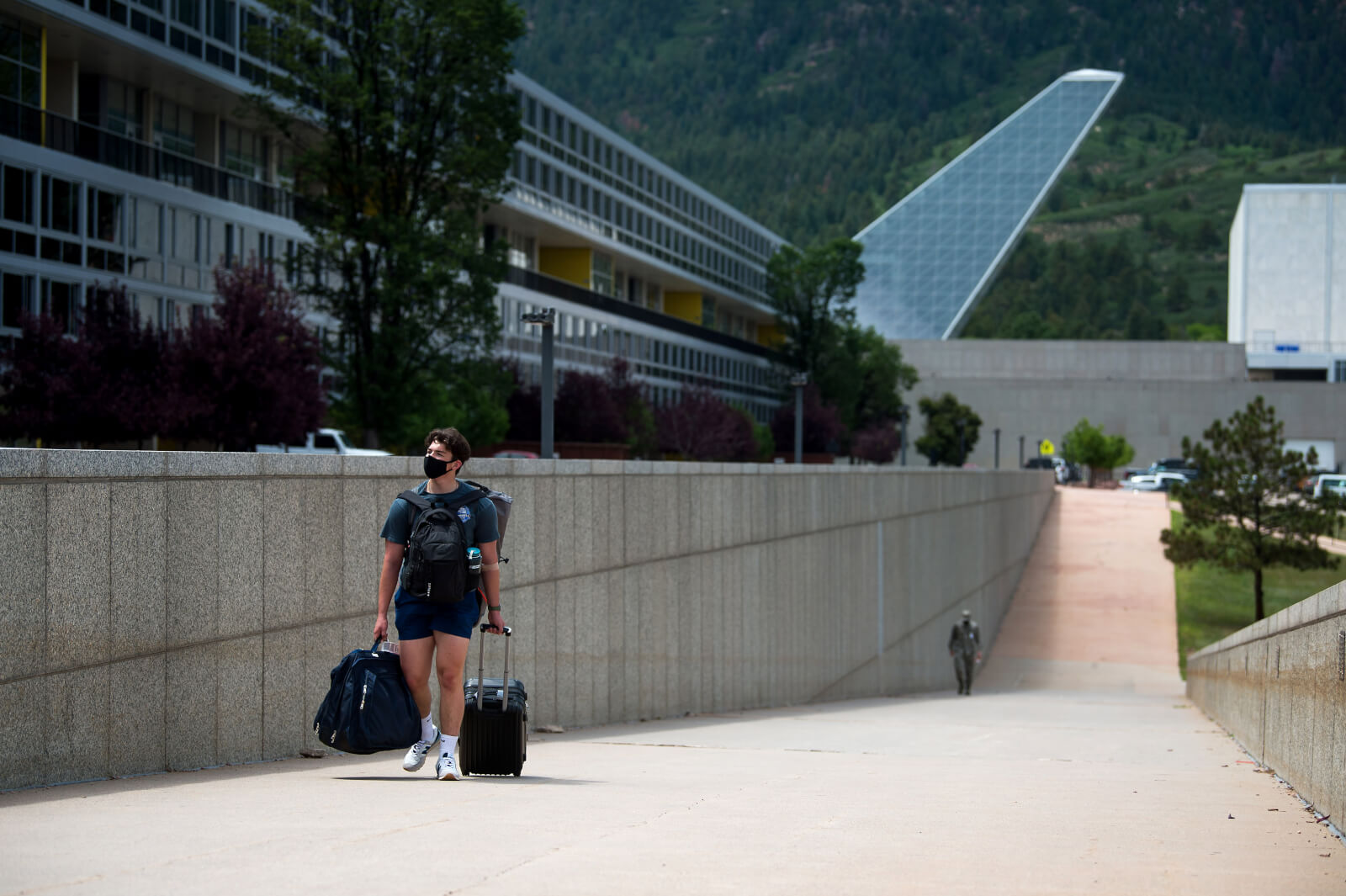Cadets return to Academy under strict safety guidelines
 (U.S. Air Force photo/Trevor Cokley)
(U.S. Air Force photo/Trevor Cokley)
Staff report, July 29, 2020
U.S. AIR FORCE ACADEMY, Colo. — The Air Force Academy welcomed the entire cadet wing back from the summer break and leaders at all levels at the school continue to prioritize the health and safety of cadets, faculty and staff.
More than 1,300 Cadets arrived July 26-27, four months after leaving the school in March to study online as the COVID-19 pandemic hit the U.S. The first stop when they arrived was the medical clinic.
Strict health and safety precautions have been set in place to decrease the spread of the coronavirus among the returning cadets, including multiple COVID-19 tests for each cadet, restricted movement and ample social distancing space across all cadet activities. Facemasks are mandatory for everyone at the school.
“The first priority is the health and safety of our cadet wing and our entire USAFA community,” said Lt. Gen. Jay Silveria, the Academy’s superintendent.
To further support social distancing requirements, up to 400 healthy cadets will live in three local hotels with supervision for the fall semester, beginning August 12.
“This is an option we are pursuing to allow appropriate supervised social distancing and create ‘swing space’ for quarantine and isolation in the cadet dorms,” Silveria said. “This way, we can ensure proper on-base care for those individuals who present COVID-like symptoms. Our rigorous training and adherence to military standards whether cadets are on or off base will not change as both are critical aspects of officer development.”
Cadets will attend classes online and in-person, and there will be plexiglass barriers in classrooms for faculty to stay behind. There are plans to determine if some classes can occur outdoors in large, open spaces, weather permitting.
The guidelines the Academy has established to promote the health and safety of all who live or work at the school are based on measures the Defense Department is taking across all U.S. military installations.
“These measures are not new,” Silveria said. “This is going on across the entire DoD, and we’ll continue to evaluate our local measures based on medical guidance, and the health of the City of Colorado Springs, the State of Colorado and the nation.”
Each year, on average, the Academy is home to 4,000 cadets.
The Mathematics of Disease
The Academy’s Pandemic Math Team developed a COVID-19 testing program to decrease the potential for a coronavirus outbreak.
“The most significant impact of the PMT was determining the level of Academy testing needs to ensure the safe return of all cadets for the fall semester,” said Col. Doug Wickert, the Academy’s aeronautics head.
“The most important thing is the health and safety of cadets, faculty and staff,” he said. “With the surveillance testing we are planning, accomplished ‘in house’ by the Academy’s world-class biology lab, we will be able to quickly identify a potential outbreak and stop it before it actually has a chance to start.”
Wickert described the PMT as a “multidisciplinary team of microbiologists, epidemiologists, mathematicians, medical practitioners and computer modelers.” The PMT developed a surveillance testing strategy based on the solution to the “Fizzle Equation,” which “can tell you how much testing you need based on different levels of contract tracing,” he said. “The ‘Fizzle Equation’ guarantees a potential outbreak fizzles before out even gets started.”
New Normal
Cadet 1st Class John Byrne, of Chesterfield, Missouri, returned to the Academy July 26.
“Being away from your ‘home’ and closest friends for four months is definitely hard,” he said. “Reuniting with my friends and mentors at the Academy, despite not being under normal circumstances, will still motivate me to finish strong in my last year at the Academy.”
Bryne summed up the movements the Academy took to keep cadets safe during a global pandemic as a “weird time.”
“Getting back into the day-to-day mindset of being a cadet may prove to be a little difficult at the beginning of the academic year,” he said. “However, I’m confident that our [squadron commanders] and professors will go out of their way to make the ‘new normal’ actually feel normal. Their mentoring will be monumental in helping cadets feel grounded.”
Byrne said he’s excited to begin his senior year.
“A lot has changed and a lot will continue to change during my last year,” he said. “I’m confident our leaders are still preparing all classes to be the best officers they can be.”